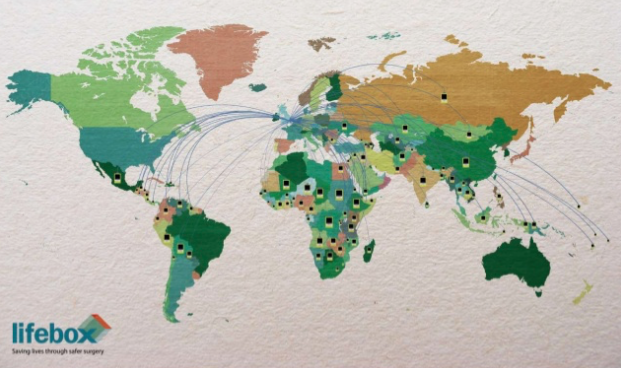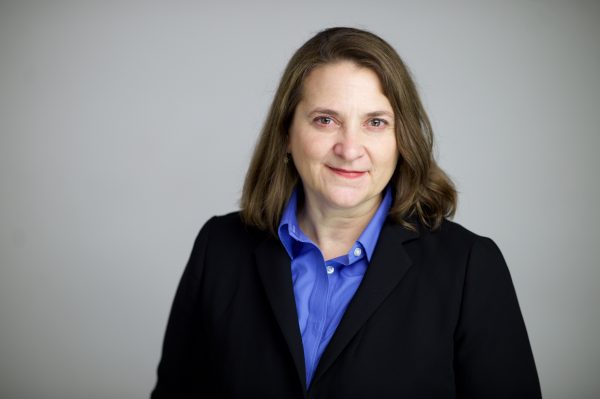
A few questions for our new CEO
Kris is passionate about humanitarian action, with a career spanning New York, Geneva, Monrovia and beyond. She saw the scale of the global surgery and anaesthesia crisis – and the critical need to address it – long before she knew Lifebox, and we’re utterly delighted that she’ll be leading the team.
Time to get to know each other!
What led you to build your career in the humanitarian sector?
My interest in humanitarian work grew directly out of my experience working on international human rights. I spent considerable time studying in China in the 1980s and 90s and confronted head on the importance of standing up for the rights of others being denied or punished for expressing their views. That an individual can take action that will make a profound positive difference in the life of another or others was and is important to me.
When I had the great fortune to join Doctors Without Borders/Medecins Sans Frontieres (MSF) in the late 1990s, I was immediately gripped by the medical humanitarian imperative to reach across cultural and physical borders to help alleviate the suffering of even a single individual.
My first deployments with MSF were in Albania and Kosovo in 1999. I saw what an impact providing medical care and shelter made on the lives of refugee and displaced families fleeing conflict. We could not solve the political or social problems facing them and did not pretend to, but the act of lending a hand to help someone in need through a difficult moment in their lives inspired me then and continues to.

You’ve spent significant time working in low-resource settings – why do you see access to safe surgery and anaesthesia as a critical concern?
Humanitarian medicine has come a long way in the past decades. Less than fifteen years ago it was considered impossible to provide treatment for complex diseases such as HIV or TB in low-resource settings even when treatment existed and was becoming routine in wealthier countries. The treatments were either considered too complex or they were too expensive. Medical staff were forced to turn sick people away to die. There is still much to do, but we have seen how concerted global effort has made a dramatic change in this situation and expanded access to life-saving treatments for millions suffering from TB, HIV, malaria, and other diseases around the world.
I believe that access to safe surgery and anesthesia is at the same juncture. In many places across the globe access to surgery is still out of reach – but with increasing investment in health systems we are beginning to see expansion in the provision of surgical services. Unfortunately, even with this expansion there are still huge gaps in meeting safe standards of surgery and anaesthesia. In West Africa, where I have most recently concentrated my work, the risk of dying from anaesthesia during surgery is as high as 1 in 133, compared to 1 in 200,000 in the US.
I am so excited to be joining Lifebox because I believe Lifebox and its partners are already showing that we can change this unacceptable situation and make surgery and anaesthesia safer for millions more around the world through concerted and collective action.
What is your own experience of the life-changing impact of surgery?
One of the most memorable deployments I had with MSF was during the civil war in Liberia in 2003. Fighting had closed or destroyed all medical facilities including hospitals that had once had surgical capacity. MSF remained in the capital of Monrovia during the harshest fighting and we were forced to convert our house into a clinic and makeshift surgical theater.
I shared a mattress on the floor of an office with one of the surgeons on our team but she never slept. I watched in awe day and night as she was called to carry out emergency cesarean sections and treat mortar wounds under lamps run by generators for patients brought in by wheelbarrow. I realised that if she had not been there, those lives would not have been saved. Full stop. There was nobody else.
From that time on I have had enormous respect for the role of surgery and anaesthesia in alleviating suffering and saving lives. This experience and subsequent ones underscored the importance of not only the surgeons and anesthesiologists but of everyone involved in the surgical process, from the OR nurses to the cleaners and stretcher bearers who all play such a key role in making any surgery successful.
You served an extended term as Secretary General of MSF International, a vast organisation. What is the biggest lesson you took from this role, and how does the experience apply to a smaller team like Lifebox?
I think the biggest lesson I took from my work with MSF is that no matter how big or how small the organisation or crisis, the humanitarian act is still about one person helping another and that this matters. What makes MSF’s work continue to remain so relevant, I believe, is by staying focused on the importance of the singular medical act and providing the highest possible level of medical care one can to every individual patient.
What so inspires me about Lifebox is exactly the same thing: putting both the patient and the provider at the center and recognising that everyone deserves to have access – and the capacity to deliver – the highest standard of surgical and anaesthesia care possible.
In just five years, Lifebox has shown that a small group working together with partners and national professional societies around the world can have a huge impact on improving access to safe surgery and anaesthesia. With simple tools like the pulse oximeter that are affordable and adapted to the needs of resource-limited settings, coupled with implementation of the WHO Safe Surgical Checklist, Lifebox is making an enormous difference in people’s lives around the world.
What drew you to Lifebox?
I was drawn to Lifebox, first, because I strongly believe that access to safe surgery and anaesthesia is not a luxury but an essential part of any health system anywhere in the world, and that not enough was being done to address this issue. Second, because I am convinced that Lifebox’s model of partnering with existing surgical and anaesthesia capacity to provide adapted tools and techniques for improving safety is the most effective and impactful approach to increasing access.
I find the Lifebox approach to working in partnerships, to sharing evidence and expertise, especially inspiring. Finally, I was attracted by Lifebox’s ability to have a huge global impact and footprint with such a small team of dedicated staff and volunteers.
What are you most excited for in the coming year – both the mission and the organisation?
Personally, I am most excited about meeting the incredible people who have made Lifebox what it is in such a short time! I am joining an amazing group of highly motivated professionals around the world who have achieved an enormous amount already, and I can’t wait to do everything I can to provide the leadership and support needed to build on and expand their important work.
I feel privileged and very excited to be joining Lifebox at a moment when its work and approach, as well as the global need to increase access to safe surgery and anaesthesia, are well recognised and there is momentum to do much more. I have a great amount to learn from Lifebox’s people and programs and look forward to meeting as many of the people that make Lifebox such a success as possible this coming year.
In addition to working to continue expanding Lifebox’s Safer Anaesthesia work through the pulse oximeter and Safe Surgical Checklist in the coming year, I am excited to see and share the results of the latest technical and innovation programmes: Clean Cut, which is targeting the problem of surgical site infections, and the optimised oximeter with an improved probe for small children.
Finally, I can’t wait to work with the team, our supporters, and partners to see how we can get the wonderful new documentary The Checklist Effect, that so movingly portrays the importance of safe surgery, seen by as many people as possible.
Lifebox works with a wide range of partners – medical professional, commercial, governmental. What do you see as the role of the NGO within this ecosystem?
We can no longer talk about an NGO, let along governments, the private sector or any individual profession, working inside its own bubble without considering the broader ecosystem in which it is operating. Understanding that ecosystem – what is possible, what is not, who needs to be involved, what are the potential bottlenecks – and then forging partnerships that engage all relevant sectors and stakeholders is critical for success.
Expanding safe surgery and anaesthesia is no different. Lifebox may be an NGO, but it is already showing that its success depends on bringing the know-how of practitioners, researchers, medical equipment manufacturers, governments and civil society together, and we must continue to build on this in the future.

